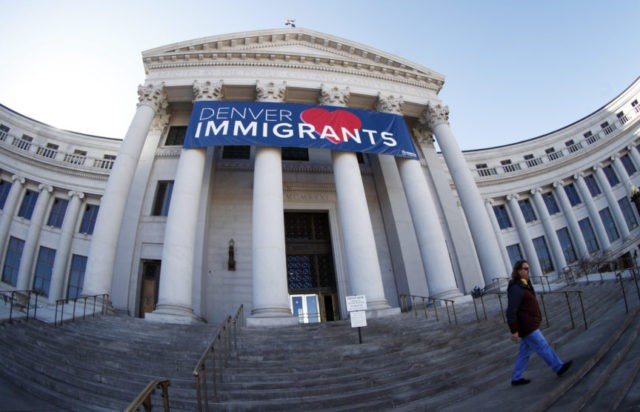Housing in the U.S. has become increasingly expensive, with many analysts saying that house price inflation is being fueled by an acute shortage of homes available for sale.
A new study suggests that policymakers looking to tame the rising cost of U.S. houses may want to cut back on immigration. It also finds that the friendlier an areas population is to new immigrants, the more house price inflation is acerbated.
There’s no doubt that home prices in the U.S. have been on big run. A report Tuesday showed the S&P CoreLogic Case-Shiller composite index of house prices in 20 metropolitan areas jumped another 0.5 percent in March after rising 0.8 percent in February. On an annual basis, house prices rose 6.8 percent in the 12 months to March, far outpacing inflation or wage gains.
The effect of immigration on home prices has long been debated by economists. On the one hand, immigration would be likely to drive up home prices by increasing demand for housing. On the other, people may be less willing to pay for homes in areas with lots of immigrants or may move out of high-immigration areas, putting downward pressure on prices.
A team of economists from Canada’s Deakin University led by Matthew Larkin found that both answers are partially right. Using a huge database of 474 estimates of immigration’s impact on house prices in 14 destination countries, they found that immigration increases house prices, on average. But they also found that attitudes toward immigration can moderate this effect, with countries where attitudes tend to be less welcoming to immigrants experiencing lower prices increases due to immigration.
“We find that, on average, immigration increases house prices but this effect varies by region and over time,” the economists write. “In countries where locals dislike living next to immigrants, for instance, immigration has a smaller effect on house prices, although we find no evidence that house prices sink as a result of immigration.”
The study was published as a discussion paper for the IZA Institute of Labor Economics, an independent economic research institute based in Bonn, Germany.
It’s not clear exactly why areas where locals dislike living near immigrants have lower home price inflation. It may be what economists call ‘out-migration,’ people leaving areas with heavy immigration in favor of areas with lower immigrant concentrations. Alternatively, it may be that the presence of immigrants simply lowers the perceived value of homes in an area, making people unwilling to pay more.
In a counter-factual analysis of the statistics, the economists find that a softening of attitudes toward immigration in the U.S., Canada, or the U.K. would cause home prices to rise even more.
Although the paper does not directly mention the implications for immigration policy, it does note that the findings should be relevant to the debate over immigration.
“Housing is a universal human right,” the authors note. “Thus, our analysis is especially timely against the backdrop of a worldwide spread of populist and nationalist politics and the rising need to provide adequate housing for dislocated populations and affordable housing for younger generations.”
The study is particularly bad news for home builders who have advocated increasing immigration into the U.S. in order to provide more workers to build more homes. It suggests that this would be, at least in part, counter-productive because the new immigrants would also drive up home prices.
The study also suggests that areas where ‘sanctuary city’ policies are popular with locals may pay the cost in terms of rising home prices and lower affordability.

COMMENTS
Please let us know if you're having issues with commenting.